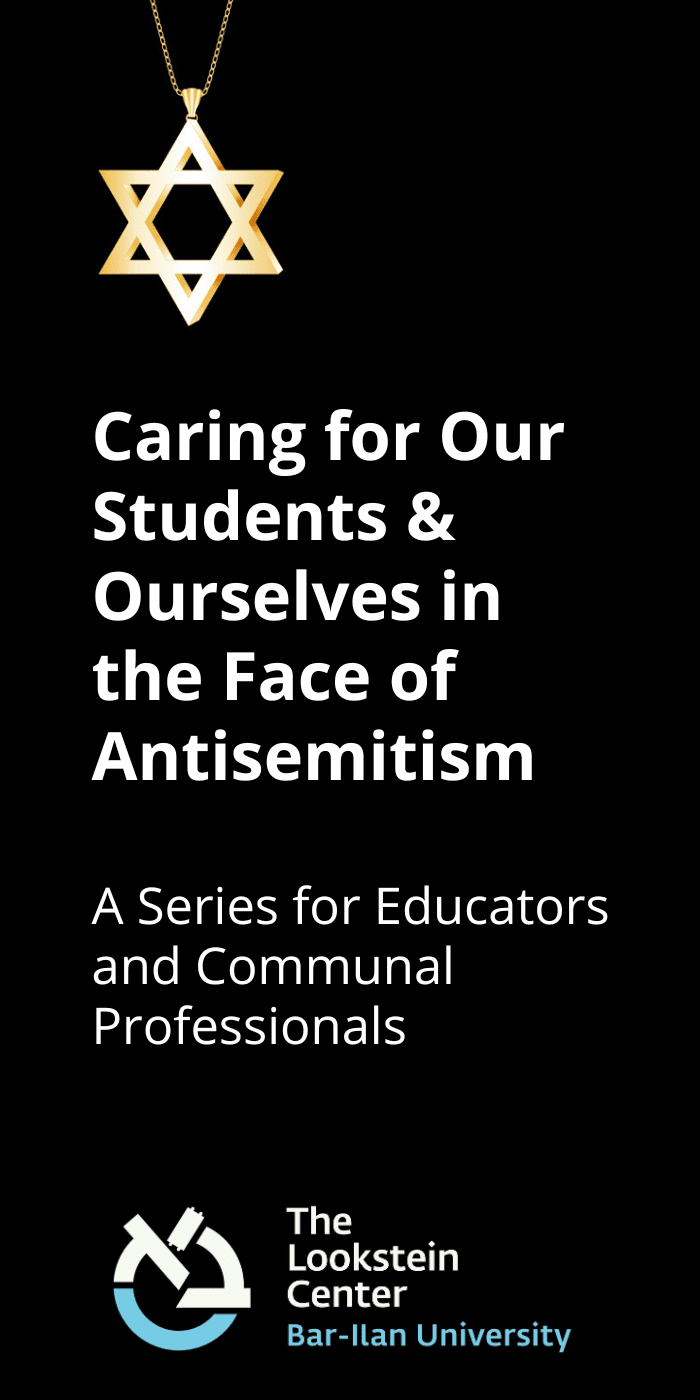Sacred Texts

Tziri Lamm is a veteran educator with over 15 years of experience teaching English and computer science in Jewish day schools. A self-described educational optimist, she focuses her instruction on building critical thinking skills and developing creativity. She is the incoming Director of General Studies at Barkai Yeshivah High School (opening September 2023).
I’ve never considered myself to be much of a spiritual person. It takes a lot to “inspire” me, and I am both skeptical and critical of the neo-spiritual movements that seem to be growing in popularity. So, it took me a while to warm to the podcast Harry Potter and the Sacred Text, a critical reading of the Harry Potter series by a pair of graduates from Harvard Divinity School. Their basic premise was that if you read a text, in a community, with rigor and commitment, it can yield meaningful spiritual value. They choose from a variety of spiritual practices, sourced from Christianity and Judaism, to focus on while reading each chapter of the series, looking for the meaning that emerges. I binge-listened to dozens of episodes over the first months of the pandemic and then brought it to my 12th-grade English honors class in the fall of 2020. They didn’t get it.
Some students were reluctant to read in a new way, but even more of them took personal affront to the notion of ascribing spiritual status to a secular text. They didn’t want to apply hevruta learning in English class or engage in the monastic practice of lectio divina. They were most resistant to the idea of blessing characters at the end of a lesson, so we soon pivoted to more traditional classroom activities. In 2021, we only listened to the introductory episode of the podcast and half-heartedly engaged in lectio divina. This year, I mentioned that I was inspired to teach Harry Potter during the pandemic before using literary theory to analyze the text.
Yet, even as I backed away from the podcast and its approach, I kept thinking about a sentence in the introduction to The Power of Ritual written by former co-host of Harry Potter and the Sacred Text, Casper ter Kuile. In the opening to a book that discusses how to find ways to bring purpose and meaning into our lives, he makes the claim that:
the spiritual offerings of yesteryear no longer help us thrive. And that, just like stargazers of the sixteenth century had to reimagine the cosmos by placing the sun at the center of the solar system, so we need to fundamentally rethink what it means for something to be sacred.
He discusses gratitude practices, community meals, and tech Shabbat—making me quickly realize that I was not his imagined reader, even as I found myself thinking more and more about sacredness and spirituality.
It’s so easy for ritual Jewish observance in Jewish day schools to become, well, ritualized, especially for students but even for teachers. Tzeniut (modesty) becomes about dress code and the few teachers willing to nag you about the length of your skirt, and tefillah becomes the thing you’re forced into because it’s part of your school day—especially as you realize that you have to be in school so much earlier because of minyan. Following halakha gets blurred with following rules, and before you know it there’s no meaning outside of “do it because I told you so.”
I’ve seen these attitudes follow my children home, when I have to choose between forcing them to go to shul and allowing them to choose to stay home, when I ask, yet again, for someone besides me to share divrei Torah at the Shabbat table, and when I wonder how thousands of years of Jewish spirituality can compete with the modern allures of social media and entertainment. Post-pandemic, I knew, deep down, that I myself was beginning to wonder where all of my passion for observance had gone. Wondering when it had all become rote, doing things because I didn’t know how not to, not because of any driving spiritual imperative.
I didn’t make an explicit connection between these concerns and my decision to attempt learning parashat hashavua using the traditional shenayim mikra (read the text twice, then the translation) at the beginning of the Hebrew year 5782. It was the first time I’d be engaging in serious Tanakh study since I graduated from high school twenty years before. Buoyed by the way learning made me feel, I added on Nach Yomi (one chapter of Nakh daily) when the OU’s Women’s Initiative began its second cycle in January of 2022. I expected to learn about texts I didn’t know or didn’t know well enough. I expected to gain new insights into texts that I could still recite by heart. But I never expected to find myself radically transformed, both spiritually and intellectually. And I certainly never expected that my learning would have any impact on my role as a teacher.
When I first started learning, I was sure I wouldn’t be able to maintain a consistent learning practice. Sustained, repetitive actions have never been my strong suit. Star charts would fall off the refrigerator long before they had been filled, and I’m not sure that any of my children successfully completed summer homework unless you count frantically doing it all in a span of two days. But something about this commitment has been different. My daily study of Nakh has been more challenging, and I’ve had more than a few “catch-up” weeks, but I haven’t missed or failed to complete a parashah.
Over this last year and a half, I’ve come to see spirituality in a new light, to rethink my relationship with time, and to truly understand the value of rituals—both the ones that have long been part of our religion and the ones I create for myself. I’ve come to appreciate the power of small moments of daily study. Learning at a pace that gives rise to more questions than answers, that almost bombards me with new information or old information in a pared-down way, has sparked a sense of connection and curiosity. It has given me the chance to find patterns, to ask bigger questions, and most importantly, to begin to understand the vastness of Judaism. It’s given me the confidence to seek out a version of Orthodoxy that harmonizes with my views of the world instead of needing to compartmentalize the varied ways I experience life.
I don’t think that it’s a coincidence that for the last couple of months, between teaching the most diverse load of courses I’ve ever taught and navigating a significant career shift, the beginnings of a theory of education have been forming in my mind. I’ve been thinking of it as “Deliberate Practice,” the idea that small teacher actions, that may seem insignificant on their own, when practiced with intention and thoughtfulness, can have an outsized impact on student learning and development. It’s the notion that giving careful thought to routines and discrete moments in the day and choosing to adopt simple, scalable strategies can make a difference.
I’ve been paying attention to the daily routines that I have, and that I haven’t been able to maintain in my classroom. I think about the classes where we have fewer routines to guide us. I think about the power of asking the same simple questions each day, of cycling through the same conversations as we make subtle and sustained growth. I think about the power of approaching a text in community, with rigor and commitment, and I realize that I’ve been engaging in sacred reading all along, despite not naming it that. I come back, again and again, to the words “we need to fundamentally rethink what it means for something to be sacred,” and I think about protecting time for reflection, reading, and rituals.
Perhaps I’m more spiritual than I’ve given myself credit for. Maybe I just needed to find the right practice, the right ritual that would allow me to exercise my creativity and curiosity in a way that feels meaningful to me. Maybe that’s what we need to give our children—the space to explore the world and discover, in both tradition and modernity, what it means to be creative, curious thinkers who can build their own wellsprings of meaning to share with others.



Tziri Lamm is a veteran educator with over 15 years of experience teaching English and computer science in Jewish day schools. A self-described educational optimist, she focuses her instruction on building critical thinking skills and developing creativity. She currently teaches at Yeshivah of Flatbush Joel Braverman High School and is the incoming Director of General Studies at Barkai Yeshivah High School (opening September 2023).
Reach 10,000 Jewish educational professionals. Advertise in the upcoming issue of Jewish Educational Leadership.





I really enjoyed reading this thank you so much for sharing. It is truly refreshing to see educators that are taking the initiative to really seek out what genuinely cultivates and incorporates learning, religion, and spirituality as we with our children grow and develop along the journey of life.